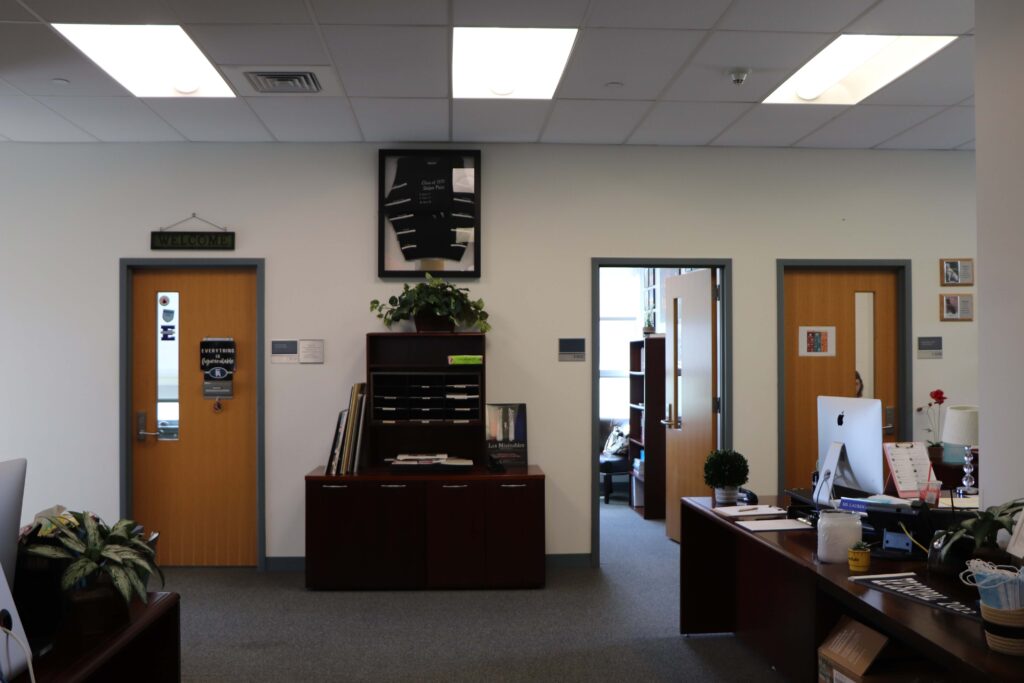Riya Shankaran ‘26
In a Town Hall meeting with the EA community on October 6, Head of Upper School Michael Letts announced that the school will continue to evaluate its academic, behavioral, and mental health services. The administration will look for ways to expand programming to students and add more structure to existing programs. “[EA will aim to] do more directed programming across all divisions, infuse it into the coursework, and create a course in the Middle School or Upper School that is much more directed and spends more targeted time on [mental health],” states Letts.
Letts believes that the current mental health situation among teenagers requires attention, commenting, “Teen mental health is not in a good place. I worry at night about how you guys are doing, if you’re okay, if your mental and behavioral health is in a place that we need it to be.” Upper School Counselor Caroline Graham also feels that EA needs to address mental health st outside of the classroom. She says, “Mental health gets stigmatized. Being a teenager is really hard, and I am sure there are many EA students navigating these struggles.”

Photo courtesy of Douglas Baldino ’23
Graham thinks that social media is a factor contributing to such mental health issues in teenagers. She claims, “There is something about the constant access to information and just the stimulation of scrolling. [It] creates a lot of noise… I think what’s hard about [social media] is that it becomes this way where people think they are just relaxing or decompressing, but it’s not what we call a one-minded activity.”
Daniel Demessie ’24, a social media user, states, “I feel that [social media could] impact students’ mental health. There could [potentially] be forms of an addiction that arise from using social media.” Additionally, Amelia Wondrasch ’23 shares that social media can set false expectations about beauty standards and create a “FOMO” from various social events. She says, “[Social media] makes it easy to edit yourself nowadays, so people often compare themselves to others’ in-authentic appearance.”
Additionally, Upper School Psychologist Nicole Chaikin believes that the college process has been a major source of angst among teenagers as well. She says, “Over the past couple of years, [there has been] an increase in anxiety and worry about the college process because COVID-19 shifted a lot of how we operate.”
EA students have witnessed the mental health crisis firsthand. Landry Newman ’26 says, “It all went downhill during quarantine, and it was definitely not a good period for people’s mental health. Not being able to socially interact as much definitely decreased our mental health.” Bella Bin ’24 thinks that the academic pressures at EA also affects students’ mental health, stating, “[The] workload can be a lot, and if you have a lot of hard classes, whether or not they are honors, it can all be difficult.”
Graham encourages EA students to join the new Upper School club, Minds Matter, to learn about resources at EA and “how to catch general, collective, shared understanding of mental health.”
Jenny Bui ’23, founder and student leader of Minds Matter, explains, “[The mission of the club is to] bring EA kids together in a safe space and have them talk. We want to bring awareness to mental health, and we want to destigmatize the negative connotations associated with mental health.”
Although the EA administration has made no clear decisions about expanding future mental health programs, Graham hopes we can ameliorate the current situation by “taking away any kind of stigma as much as possible.” She concludes, “Everyone has a hard time and everyone’s mental health struggles are different. There is no set formula of what it might look like and how it’s going to get better. But, we just want everyone to feel like they have a place and a person to talk to in order to help them get through this.”
If you or someone you know is experiencing a mental health crisis, please reach out for help. You are not alone!
Resources at EA
*Upper School psychologists/counselors Dr. Chaikin & Ms. Graham (offices in Upper School Admin Suite), Form Deans, Mr. Letts, Mrs. Hurst, Father Gavin, teachers, advisors, coaches, ANY adult at school will listen, support, and guide you to get help.
*Safe2Say school safety program to anonymously submit tip to school
National Crisis Resources
Call 911 if someone is in immediate danger
Call 988 to connect to the National Suicide Prevention Lifeline
National Crisis Text Line text HOME to 741-741
The Trevor Project support for LGBTQ
*text START to 678-678
*call 1-866-488-7386
*message https://www.thetrevorproject.org/get-help
Local Crisis Resources
Delaware County Crisis Connections Team (DCCCT) 1-855-889-782
Chester County Crisis (610) 280-3270
Crozer Chester Medical Center- Mental Health Crisis Services (610) 447-7600Philadelphia County Suicide and Crisis Intervention Line (215) 686-4420